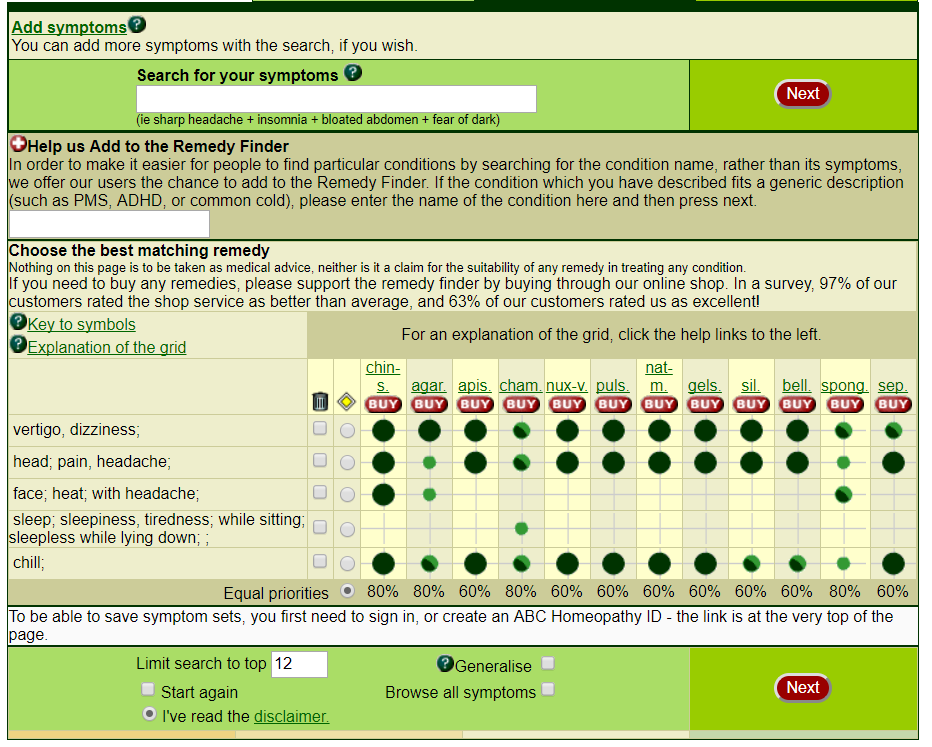Introduction
The major goal of this assignment was to select a homeopathic remedy suitable for personal symptoms and then provide a thorough reflection on the experience of taking it. In addition, another part of this paper will present research findings concerning the identified remedy. This will be done for the purpose of delivering information about its effectiveness or non-effectiveness. Since homeopathic treatments are not scientifically recognized as efficient, it is necessary to test every one of them individually and see whether or not they work for particular health problems and symptoms.
Chininum Sulphuricum for Headaches with Face Heat, Chill, and Dizziness
Formulating the list of symptoms for the grid, I used some of the symptoms I have been experiencing lately due to changes in weather and tiredness. The symptoms I put on the grid included dizziness, headaches with face heat, and chills. According to the results presented in the grid, the remedy shown on the left side was described as the most effective. Also, it matched all of the symptoms listed above and was marked as highly suitable, with an effectiveness rate of 80 percent. This looked like a promising result, so I started to research the remedy that was Chininum Sulphuricum. This substance is a mineral that is also known as Glauber’s salt. Some of the benefits of this remedy included the alleviation of digestive problems, balancing out the level of water in the body, and the removal of toxins. In addition, the remedy is said to be taken for headaches, asthma, and liver conditions. One of the most common uses of Chininum Sulphuricum is for the purpose of treating tinnitus.
I purchased the remedy in the form of granules. It recommended that five granules are taken three times a day. The overall course included a 10-day treatment. On the first day of treatment, I started experiencing the symptoms since morning. I took two portions of granules, and the symptoms continued throughout the day. They disappeared in the evening a while before I had to take my third portion of the remedy. As a result, I concluded that the remedy showed no immediate effect. On the second and third days, the symptoms did not come back, and I continued to take my remedy. Soon, the symptoms returned, and the granules showed no effect for three more days. It was challenging to keep away from my regular remedies and medications that help with the symptoms. Chininum Sulphuricum had little to no effect on my condition.
Research Studies Exploring Chininum Sulphuricum as a Remedy
It was challenging to locate recent research studies about this remedy. Also, most of the studies that could be accessed focused on the properties of Chininum Sulphuricum that helped to treat tinnitus. In particular, Price (2015) explored the effectiveness of this remedy for buzzing and ringing in a patient’s ears, as well as other sounds that impair hearing. Also, the author noted the remedy’s properties that help to minimize vertigo. Rajan, Ravichandran, and Bagai (2017) noted that Chininum Sulphuricum could be used as a part of malaria treatments. Also, Gupta, Gupta, and Pandey (2015) referred to this remedy as the one helping with acoustic/vestibular problems, which, again, stands for its properties, helping to treat tinnitus and vertigo. Another study focusing on this remedy as a medication for tinnitus was carried out by Buzescu (2013). As a result, one could suppose that the effectiveness of Chininum Sulphuricum as a cure for headaches, chills, and face heat is rather minor.
Appendix

References
Buzescu, M. (2013). Comparative study of treatments for tinnitus: Allopathy or homeopathy? Medical Sciences, 6(55), 39-44.
Gupta, G., Gupta, N., & Pandey, D. (2015). An evidence-based case of acoustic/vestibular schwannoma. Indian Journal of Research Homeopathy, 9(1), 49-54.
Price, A. P. (2015). Tinnitus STOP!: The complete guide on ringing in the ears, natural tinnitus remedies, and a holistic system for permanent tinnitus relief. New York, NY: Living Plus Healthy Publishing.
Rajan, A., Ravichandran, R., & Bagaim, U. (2017). Homeopathy against Malaria: It’s potential as a third millennium drug. Alternative and Integrative Medicine, 6(1),1-5.

